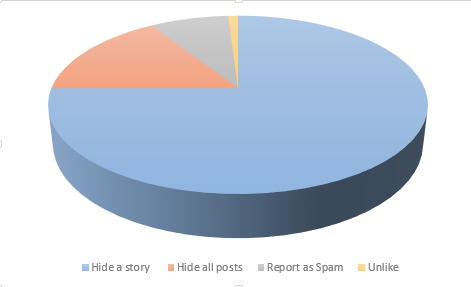The Reason Why Facebook Pages Are Losing Reach?

Most of you already know that Facebook has evolved its EdgeRank algorithm over time, which means that Page admins need to have some tricks up their sleeves in order to get a higher reach. Facebook values in a lot of quality factors, which collectively decide how many people can a post reach. But did you know that Facebook is now heavily weighing in negative feedback for posts in order to rank them? Are you doing everything you can to grow your reach, but still losing your reach? We might have an answer.
Negative Feedback
One of the major changes introduced in the EdgeRank algorithm is the post negative feedback that Facebook is giving an ever-increasing weight to. So what is this negative feedback we're talking about? Facebook surely hasn't introduced a 'Dislike' button, has it?
Indeed no, but it has other buttons that will do the same, more or less. Negative feedback is defined as any time a fan performs any of the following action(s).
- Hide a story
- Hide all posts from a Page
- Report as spam
- Unlike a Page
As you can well imagine, negative feedback on your content can effectively destroy your post's reach. Facebook takes these things in account in order to try and combat spammy pages. It is quoted to have said:
If a specific post has received complaints by other users who have seen it, or the page who posted it has received lots of complaints in the past, you’ll be less likely to see that post.
How to avoid negative feedback?
In order to avoid negative feedback, we must first understand how fans are reporting it. According to a study, the most common action a Facebook fan takes in contributing towards negative feedback is to simply hide a post.
The most common thing Facebook fans will do when they do not want to see your page’s post in their news feed is to simply hide it. The distribution of negative feedback actions and how often Facebook users take them is given below.

Images are negative feedback magnets
Images drive the most engagement, but they also drive the most Negative Feedback One of the most frequently suggested EdgeRank optimization tips is to post images regularly. While this is often true, it can be abused. Use images when applicable and don’t post too many of those viral cat photos just to pick up some cheap engagement. Use your judgement and creativity to bring true value to your images posts.
Images simply catch the attention of Facebook users more than any other content. Good or bad. So if your images are not good, they will attract negative feedback quickly.
Keep content in line with your fans’ expectations
If you’re a startup, and you’ve placed a like button on your newsletter suggesting people to become fans to stay up to date with your latest research: Be warned.
Your fans expect that type of content in the news feed and will not hesitate to hide your content when it strays off topic. Certainly, your fans won’t revolt every time you do this, but over the long term it is most likely not worth it.
Expect a correlation between engagement and negative feedback
The more people that are seeing and interacting with your content, the greater reach it ultimately will have. However, this might start to impact your negative feedback. As a post starts to gain popularity, it will also start to get into people’s news feeds that are not use to seeing your page content. And some of these fans simply will not be interested in your content.
Some of the most engaging posts might also have some of the most negative feedback. Be sure to benchmark your content to insure that you’re looking at negative feedback per person reached to help provide context to an increase in negative feedback. Making sure your fan acquisition efforts are sound may help avoid some of this as well. If you target your page’s fans well, focusing on finding existing customer for instance, fans will be less likely to hide your page’s content.
This focus on Negative Feedback will reduce spam and impact reach in doing so. So as a brand manager you’ll need to keep this new strong variable in mind when creating content. Just remember everything in moderation and understand your fans’ expectations. All the best ;)

 Clash Royale CLAN TAG
Clash Royale CLAN TAG